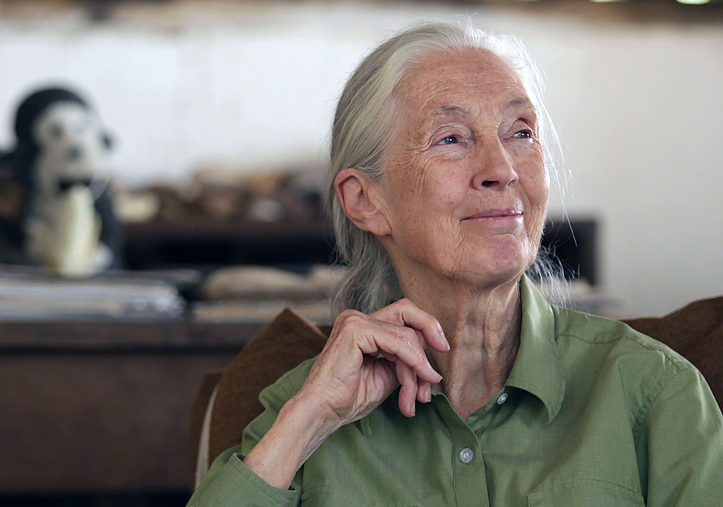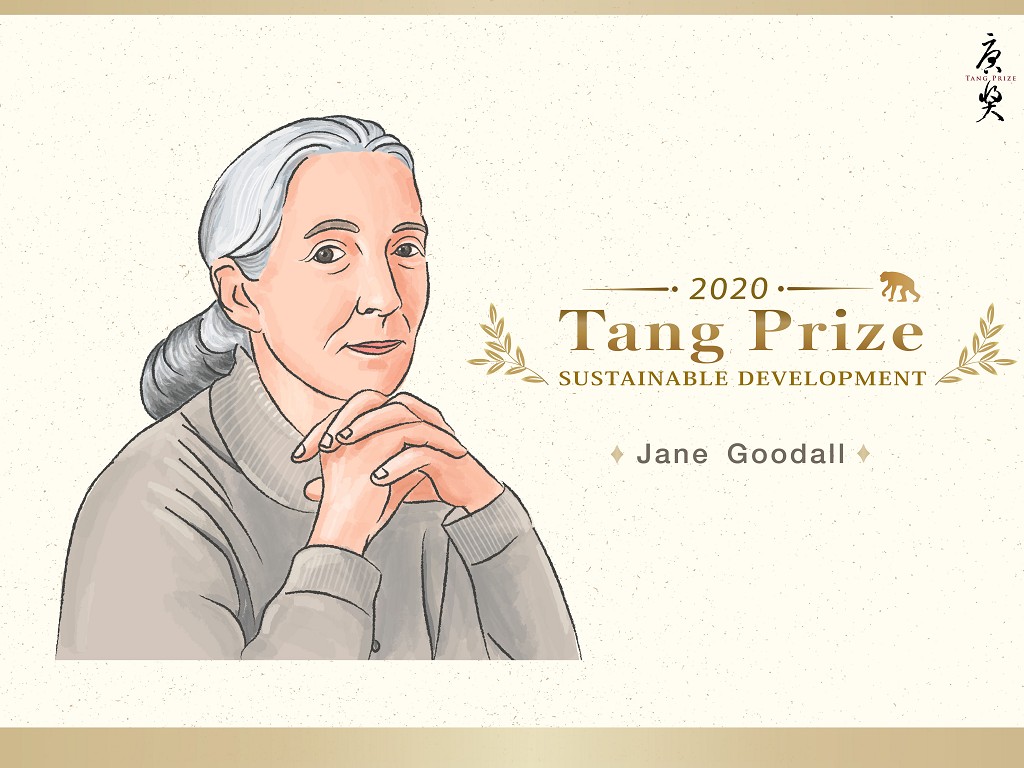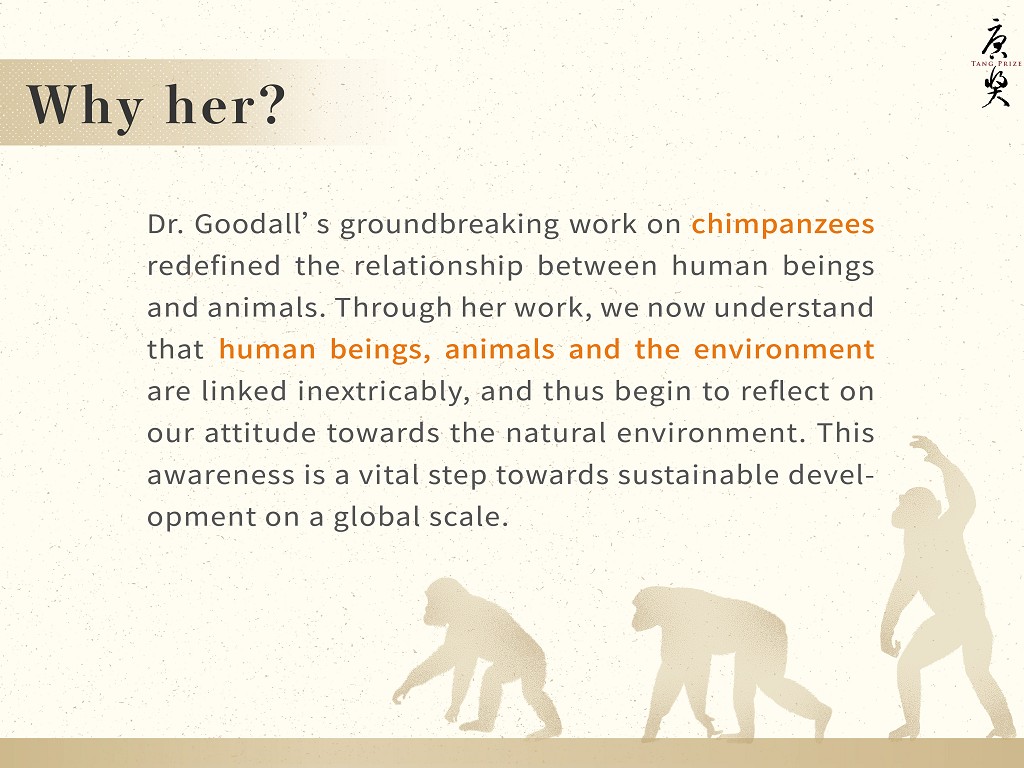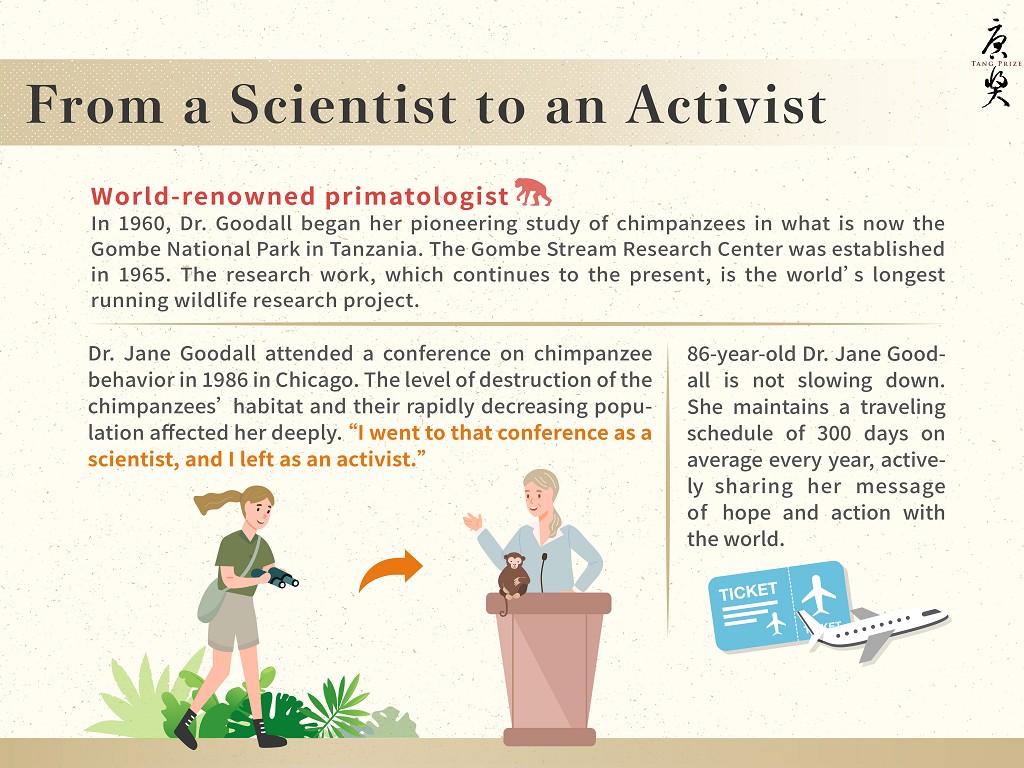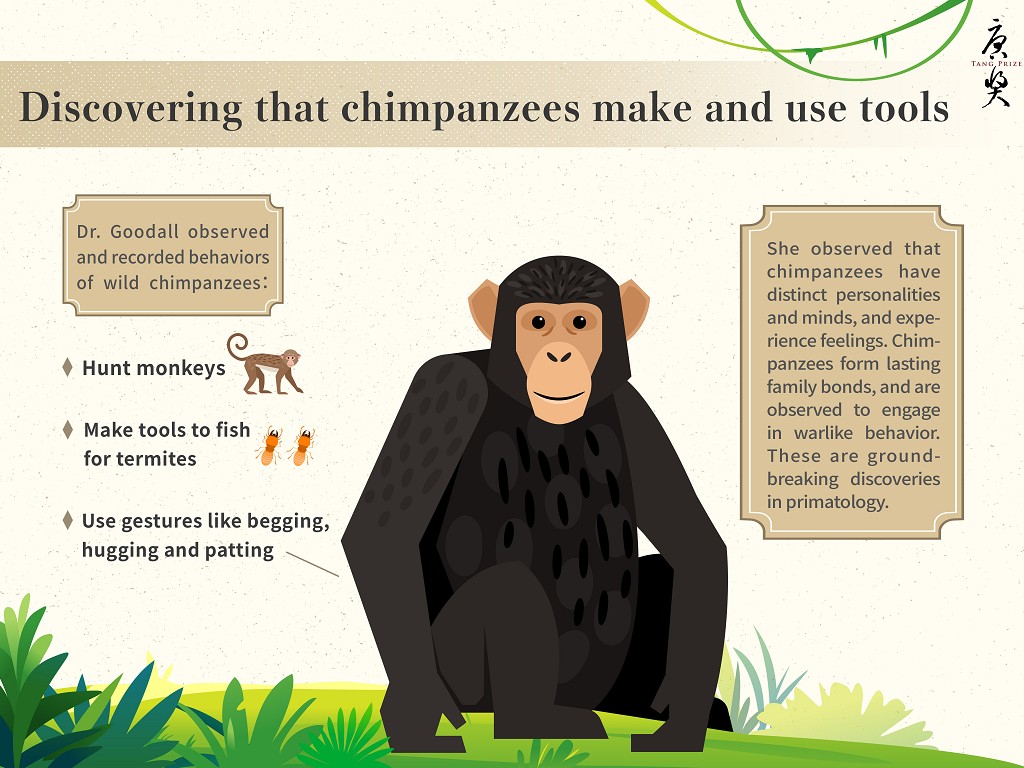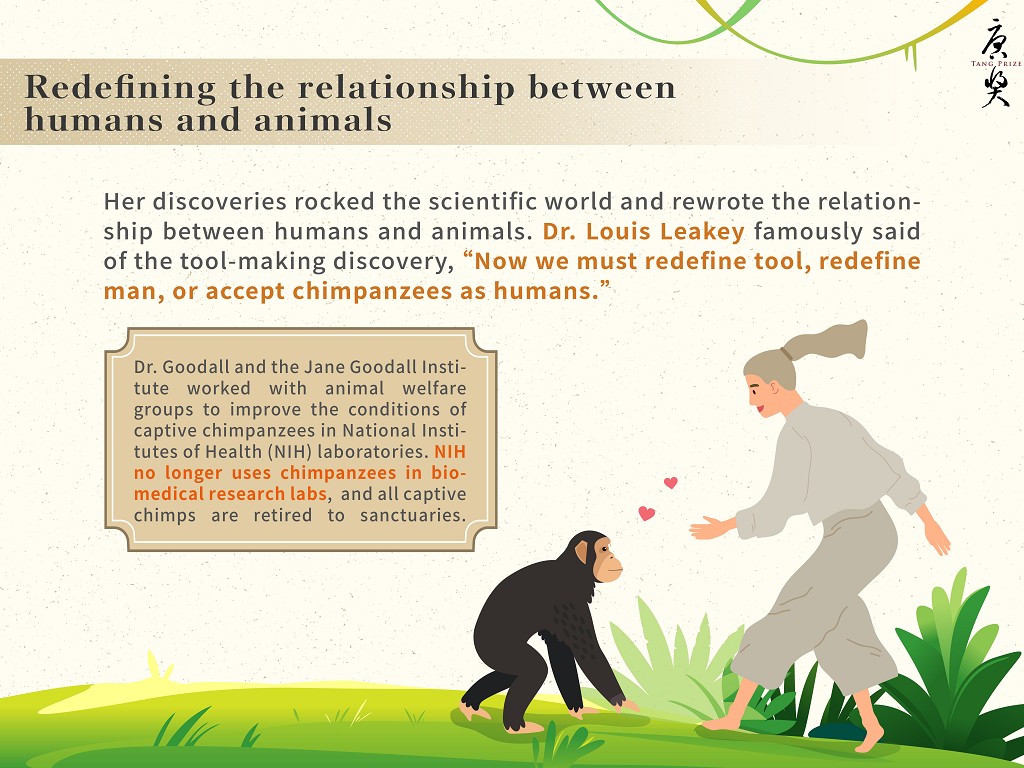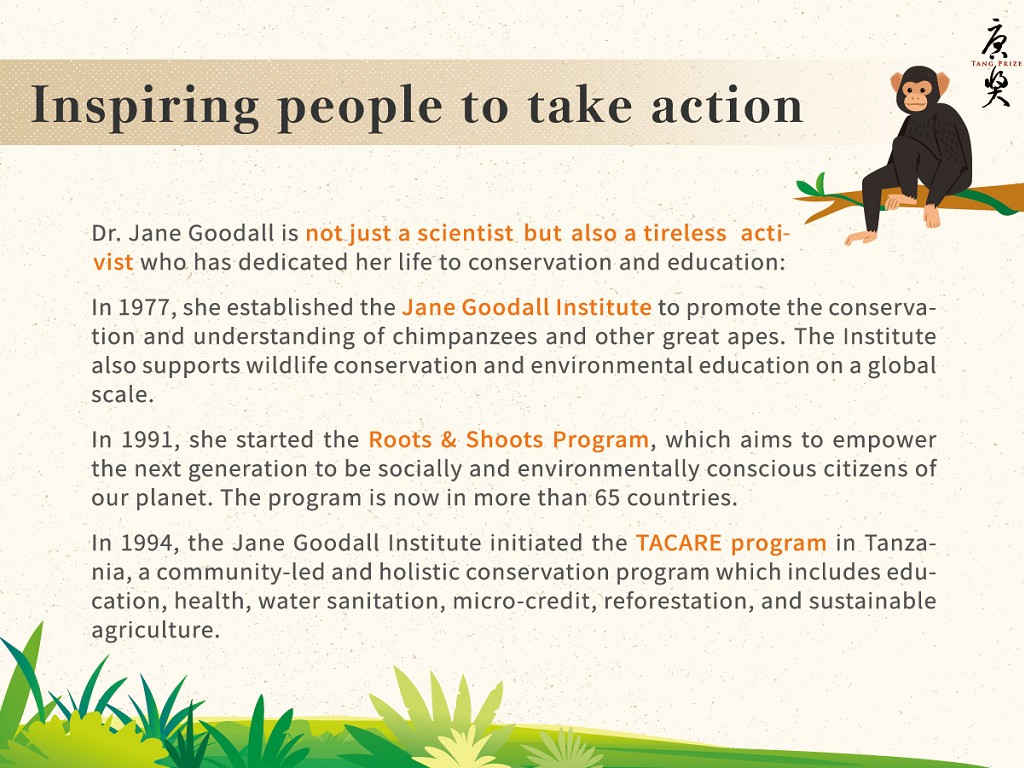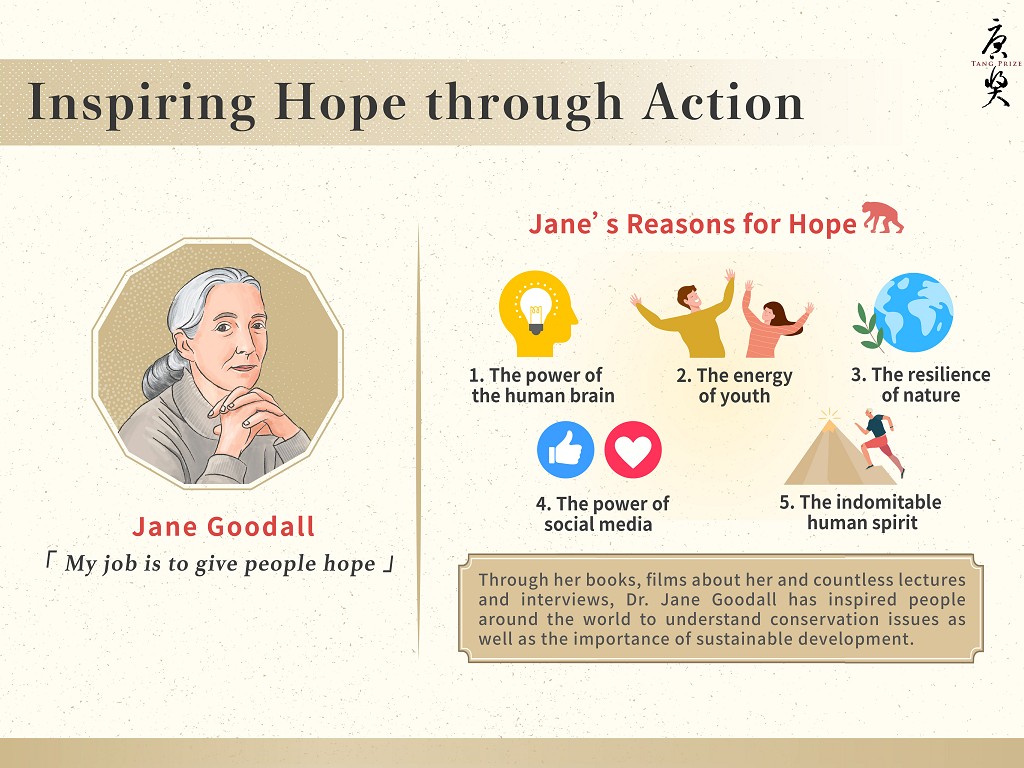Tang Prize in Sustainable Development 2020 is awarded to Dr. Jane Goodall, recognizing her ground-breaking discovery in primatology that redefines human-animal relationship and her lifelong, unparalleled dedication to the conservation of Earth environment.
The world-class primatologist and ethologist Dr. Jane Goodall is best known for her 26-year extensive study through direct contact with wild chimpanzees in Gombe Stream National Park, Tanzania. While visiting her friend in Kenya in 1957, she met the celebrated anthropologist Louis Leakey, who saw in her a person “who was patient and thorough—one who could survive long stretches of isolation, who could sit and watch and learn, and considered her the perfect candidate for his latest project—observing primates in the wild”. Dr. Leakey obtained a grant for her to collect data on chimps in the wild and to study their similarities to humans. She started her research in 1960.
In 1962, she entered Cambridge University as a Ph.D. candidate, one of the few people in University’s history to be admitted to graduate study without a college degree. She earned her Ph.D. in ethology in 1966 and continued her research in Gombe. She observed and recorded chimpanzees’ behaviors, which include killing and eating monkeys, making small tools for probing into termite tunnels, gesturing to each other such as begging with outstretched hands, patting and embracing, and many more. Those groundbreaking discoveries of social and family interactions of wild chimpanzees provided a firm basis for a wide range of evolutionary theorizing and secured her the position as one of the greatest field scientists of the 20th century. Her discovery in 1960 that chimpanzees make and use tools rocked the scientific world and redefined the relationship between humans and animals. Dr. Leakey once proclaimed, “Now we must redefine ‘tool’, redefine ‘man’, or accept chimpanzees as humans.” And Harvard’s Stephen Jay Gould would call Dr. Goodall’s observation “one of the great achievements of twentieth-century scholarship”.
In 1965, Dr. Goodall established the Gombe Stream Research Center in Tanzania and served as its Scientific Director during 1967–2003. She is not only an academic scholar publishing important scientific papers, but also a true activist who dedicates her life to promoting the cause of preserving the Earth’s natural environment with unparalleled energy and efficiency. She established the Jane Goodall Institute in 1977 to advance her work beyond chimpanzee studies. Realizing the threat to chimpanzees and their habitats posed by human activities, the Institute has worked hard to collaborate with local communities to address their needs, as well as the conservation of the great apes, introducing sustainable farming methods, building better health facilities and providing educational opportunities. The Institute now has more than 30 offices around the world, including one in Taiwan. Dr. Goodall has great concern about the environmental change that the humanity is experiencing. She used to say “When nature suffers, we all suffer. And when nature flourishes, we all flourish.’’ At a time when our planet is in peril caused by climate change and human-inflicted harm, Dr. Goodall believes there’s still time for us to take action. She believes that there are five reasons for hope—“human intelligence, young people, nature resilience, social media, and the tenacity of humans”.
In the late 1980s, seeing the accelerated pace of deforestation and declining chimpanzee populations beyond Gombe, Dr. Goodall knew that local conservation efforts elsewhere were not enough and realized she had to leave her beloved Gombe to save chimpanzees from extinction. Dr. Goodall's commitment to making the world a better place for humans and animals is especially inspiring. Her global educational program, the Jane Goodall’s Roots & Shoots Program established in 1991, is now in over 65 countries. The program has been nurturing young stewards of the earth through positive actions in their communities. Over 10,000 Roots & Shoots groups around the world are actively involved in projects that serve their communities, better the environment and help the animals.
Dr. Goodall is now 86 years old, but she still travels an average of 300 days a year to visit school children and speak in packed auditoriums about the threats facing chimpanzees, the other environmental crises we face, and her reasons for hope that human beings will ultimately solve the problems we have created.
Through her unparalleled knowledge, Dr. Goodall helped to guide the U.S. National Institutes of Health through a pivotal change in U.S. biomedical research: ending invasive research on chimpanzees and strategically relocating them to federal sanctuaries for retirement. This decision and its positive outcomes, which are still ongoing today and will continue for decades to come, are due not only to Dr. Goodall's counsel, but to her decades of research on chimpanzees.
Dr. Goodall’s first article was published in 1963 and was featured on the December 1965 cover of National Geographic. She has published 16 books, 15 children’s books and about 100 scientific articles together with her collaborators that appear in prestige journals, including Science and Nature. Several of her books won international awards at the highest level and were translated into more than 13 languages. Furthermore, she produced many films on the necessity of treating animals humanely and the conservation of Earth’s environment. Through her innumerous speeches, interviews, books and films, she has successfully driven the cause of natural conservation and the need to achieve sustainable development deep into the heart of the public of all age groups worldwide. Her appointment as UN Messenger of Peace by then UN Secretary General Kofi Annan in 2002 perfectly symbolized her global role in sustainable development.
Dr. Goodall’s innovative and holistic approach, linking her research goals to behavior, community, and environment, has led to our better understanding of the inextricable connections among chimpanzees, humans, and our common environment—planet earth. Her elucidation of this relationship leads to a deep reflection in human conscientiousness and eventually a new awakening of human attitude towards the natural environment. This awakening is one of the main foundations of the global movement towards sustainable development.
